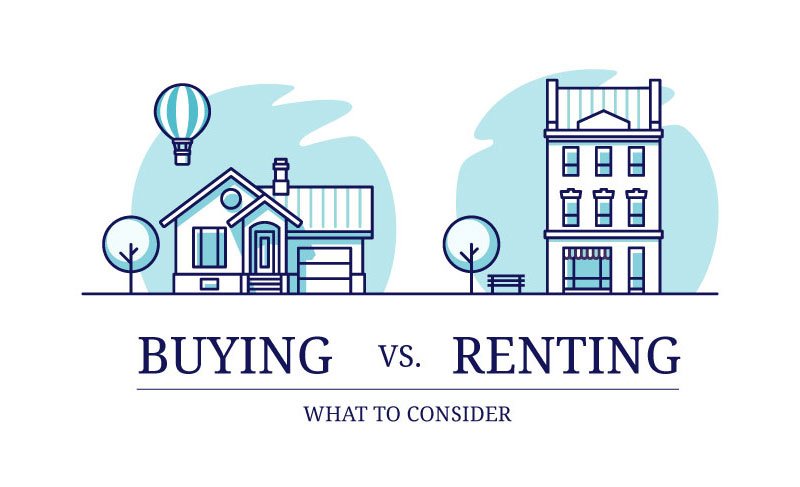What are the 4 Types of Real Estate?
Real estate is a vast and intriguing field that encompasses a wide range of properties, each with its own unique characteristics and investment potential. Whether you’re a first-time homebuyer, an aspiring investor, or simply curious about the different types of real estate, understanding the various categories is crucial.
In this comprehensive guide, we will delve into the world of real estate and explore its different types, providing you with valuable insights to aid in your decision-making process.
Residential Real Estate
Residential real estate refers to properties designed for individuals and families to live in.
Let’s take a closer look at the different types within this category:
Single-Family Homes
Single-family homes are standalone properties designed to accommodate one family. They typically feature a private yard and offer a sense of privacy and independence. These homes come in various architectural styles and floor plans, catering to diverse preferences. While single-family homes provide homeowners with the freedom to personalize and modify their living space, they also require more maintenance and can be costly.
Pros
- Appreciates well in the long run
- Complete ownership with no shared spaces
- Customizable to suit the lifestyle
Cons
- High maintenance costs
- Lower rental yield than multi-family homes
- Difficult to scale for real estate investors
Multi-Family Homes
Multi-family homes, as the name suggests, are properties that house multiple families in separate residential units. These can include duplexes, triplexes, or apartment buildings. Multi-family homes can be an attractive investment opportunity as they generate rental income from multiple tenants, increasing cash flow potential. However, managing multiple units and dealing with tenant turnover can present challenges.
Pros
- Higher rental yields than single-family homes
- Cost efficiencies in maintenance through scale
- Geared towards investors seeking cash flow
Cons
- Regulations on rent control and tenants’ rights
- Very capital-intensive to acquire
- Property management is more complex
Condominiums
Condominiums, or condos, are individual units within a larger complex or building. When you purchase a condo, you own the unit itself but share ownership of common areas with other residents. This type of ownership relieves homeowners from some maintenance responsibilities, making condos a popular choice for those seeking a lower-maintenance lifestyle. However, living in a condo means adhering to community rules and paying association fees.
Pros
- Lower maintenance costs
- Part of the community with amenities
- The affordable entry point into prime locations
Cons
- Monthly HOA costs
- Smaller living spaces than regular homes
- Restrictions on customizations and rentals
Apartments/Flats
Apartments are rental units within larger buildings owned by a landlord or property management company. They offer flexibility, making them suitable for individuals or families who prefer not to commit to long-term homeownership. Renting an apartment provides access to amenities such as gyms, pools, and communal spaces. However, the lack of ownership means limited control over the property and possible rent increases.
Pros
- No downpayment or credit qualifications
- Flexibility to relocate easily
- Maintenance is handled by property managers
Cons
- Pay rent and build no equity
- Landlord restrictions
- No ownership benefits or appreciation
Commercial Real Estate
Commercial real estate encompasses properties used for business or profit-generating purposes.
Let’s explore the different types within this category:
Office Buildings/Spaces
Office buildings provide dedicated spaces for businesses to operate and conduct their daily activities. These properties vary in size, accommodating small startups to large corporations. Office buildings often offer amenities like parking, conference rooms, and shared facilities. Investing in office space can yield stable rental income, but it’s essential to consider market demand and location factors.
Pros
- Long-term leases provide stable cash flow
- Customizable spaces to attract business tenants
- Appreciates well in growing economies
Cons
- Significant renovation costs over decades
- Risk of vacancy during recessions
- High initial capital expenditure
Retail Properties/Spaces
Retail properties include shopping centers, malls, and standalone storefronts that house retail businesses. These properties are designed to attract customers and provide a space for retailers to showcase their products. Retail property investments can offer the potential for high returns, but they are also subject to market fluctuations and changing consumer preferences.
Pros
- Location-based income resistant to recessions
- Essential for community and daily needs
- Yields driven by consumer spending trends
Cons
- Rapidly evolving consumer preferences
- Rising e-commerce penetration
- High maintenance and operations costs
Retail assets allow commercial investors to profit from demographic and psychographic demand trends in a trade area. However, they require specialized skills to enhance experiential appeal.
Industrial Properties
Industrial properties are used for manufacturing, storage, distribution, or research and development purposes. They can include warehouses, factories, and industrial parks. Investing in industrial real estate can be lucrative due to the consistent demand for storage and logistics facilities. However, factors such as location, accessibility, and infrastructure should be carefully considered.
Pros
- Mission-critical for supply chain and e-commerce
- Long-term leases from anchor tenants
- Global demand tailwinds from technology
Cons
- Niche skillset to operate efficiently
- Capital intensive to develop
- Low per-square footage lease rates
Driven by thriving consumer sectors, industrial real estate promises solid rental income. Investments here also indirectly power innovation by enabling cutting-edge infrastructure.
Hotels and Hospitality Properties
Hotels and hospitality properties cater to travelers and tourists, providing accommodation, dining, and entertainment services. These properties can range from small bed and breakfasts to luxurious resorts. Investing in hotels and hospitality properties can be profitable, especially in tourist destinations. However, the success of such investments is heavily influenced by factors like location, market trends, and the overall tourism industry.
Pros
- Higher per-square-foot incomes than other assets
- Tap into the exponentially growing tourism industry
- Branded properties have lower risks
Cons
- Intensive operational oversight
- High fixed costs make returns vulnerable
- Challenging to maintain high occupancies
Hospitality assets provide attractive yields during normal times but require specialized management for smooth functioning. Their returns fluctuate heavily based on travel market cycles.
Overall, commercial real estate delivers higher yields than residential counterparts but requires extensive due diligence across changing business sectors and cities. Investments here also tend to be capital-intensive.
Agricultural Real Estate
Agricultural real estate primarily involves properties used for farming, ranching, and agricultural activities.
Let’s explore the different types within this category:
Farmland
Farmland is land specifically used for agricultural purposes, such as crop cultivation or livestock grazing. Investing in farmland can offer long-term stability and potential income from agricultural activities. However, factors like soil quality, water availability, and government regulations should be considered before investing.
Pros
- Tangible hard asset-producing essential commodities
- Government subsidies provide downside buffer
- Runs through families as generational wealth
Cons
- Vulnerable to climate change risks
- Challenging to scale and manage scattered plots
- Requires hands-on oversight of operations
Farmlands generate income through the sale of produce and provide a strategic back-up as food sources. While returns seem small, they are stable and outpace inflation.
Ranches and Rural Properties
Ranches and rural properties are often associated with large land parcels, typically used for livestock rearing, equestrian activities, or recreational purposes. Investing in ranches and rural properties can provide opportunities for various activities, such as farming, hunting, or running a nature retreat. However, managing and maintaining large tracts of land can be demanding and require specialized knowledge.
Vineyards and Orchards
Vineyards and orchards are agricultural properties dedicated to cultivating grapes for winemaking or growing fruit-bearing trees. Investing in vineyards or orchards can be appealing for individuals passionate about wine production or fruit farming. However, it requires expertise, patience, and market knowledge to be successful in this niche.
Specialized Real Estate
Apart from the aforementioned categories, there are specialized types of real estate that offer unique investment opportunities.
Let’s explore a few of them:
Real Estate Investment Trusts (REITs)
Real Estate Investment Trusts, or REITs, are investment vehicles that allow individuals to invest in a portfolio of income-generating real estate assets. By investing in REITs, individuals can gain exposure to different types of real estate without directly owning the properties. REITs often distribute a significant portion of their income as dividends to shareholders, making them an attractive option for income-focused investors. However, it’s important to assess the performance and track record of the REIT before investing.
Vacation Properties
Vacation properties, such as beach houses or mountain cabins, are secondary residences used for recreational purposes. These properties offer individuals and families a getaway from their primary residences. Investing in vacation properties can provide personal enjoyment and the potential for rental income during peak vacation seasons. However, factors such as location, maintenance costs, and market demand should be carefully considered.
Senior Living Facilities
Senior living facilities are properties dedicated to providing housing and care services for elderly individuals. These facilities can include independent living communities, assisted living facilities, or nursing homes. Investing in senior living facilities can tap into the growing demand for housing and care services for the aging population. However, it requires an understanding of healthcare regulations and the ability to provide quality care.
Conclusion
In this comprehensive guide, we have explored the various types of real estate, ranging from residential and commercial properties to agricultural and specialized investments. Understanding the unique characteristics, advantages, and disadvantages of each type is crucial when making informed decisions in the real estate market.
Whether you’re a prospective homeowner, an investor seeking income-generating properties, or someone passionate about agricultural or specialized real estate, this guide has provided valuable insights into the diverse world of real estate.
Remember, when considering any real estate investment, it’s important to conduct thorough research, analyze market trends, and seek professional advice when needed. By choosing the right type of real estate investment that aligns with your goals and preferences, you can set yourself up for success in this ever-evolving market.
So, whether you’re envisioning the comfort of a single-family home, the excitement of a commercial property, the tranquility of a vineyard, or the stability of a REIT, take the time to explore the possibilities and embark on your real estate journey with confidence. The realm of real estate offers endless opportunities for growth, income, and personal fulfillment.
FAQs
What factors should I consider when buying a residential property?
When buying a residential property, it’s important to consider factors such as location, size, condition, price, neighborhood amenities, proximity to schools and workplaces, and future resale value. Additionally, you should assess your financial readiness, including your budget, mortgage options, and affordability.
What are the key factors to evaluate when investing in commercial real estate?
When investing in commercial real estate, key factors to evaluate include location, market demand, rental income potential, vacancy rates, lease terms, tenant quality, property condition, zoning regulations, and potential for future growth and development. Conducting thorough due diligence and assessing the financial viability of the investment is crucial.
How can I invest in real estate without directly owning properties?
One way to invest in real estate without directly owning properties is through Real Estate Investment Trusts (REITs). REITs allow individuals to invest in a portfolio of income-generating real estate assets, typically traded on stock exchanges. Another option is investing in real estate crowdfunding platforms, which pool funds from multiple investors to finance real estate projects.
What are the advantages and challenges of investing in agricultural real estate?
Investing in agricultural real estate offers advantages such as potential long-term stability, income from farming activities or leasing the land to farmers, and potential tax benefits. However, challenges include the need for specialized knowledge, market fluctuations in commodity prices, dependence on weather conditions, and potential regulatory changes affecting the agricultural industry.
What should I consider before purchasing a vacation property?
Before purchasing a vacation property, consider factors such as the location’s appeal and accessibility, rental potential during peak vacation seasons, ongoing maintenance costs, property management options, financing options, and your personal usage preferences. Additionally, research local regulations, homeowner association rules, and any restrictions on renting the property to ensure it align with your goals and requirements.





